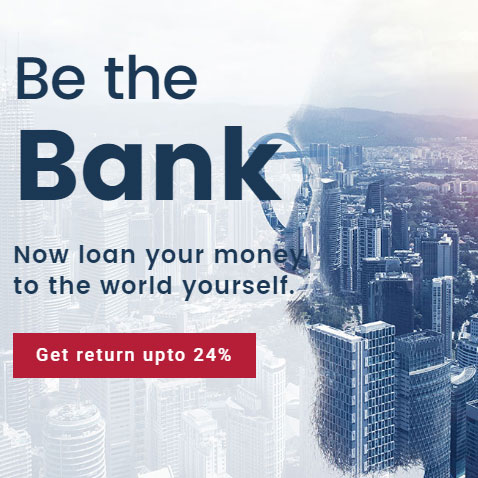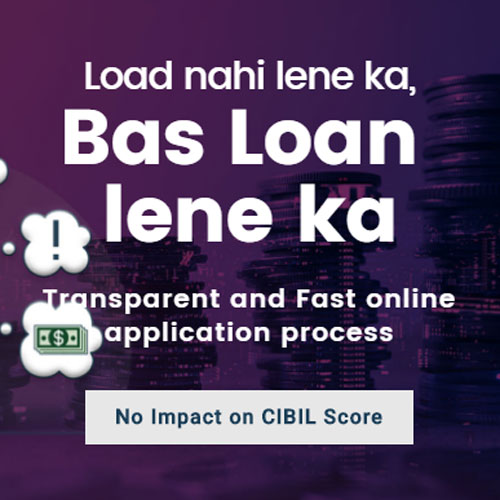Unsecured loans, as indicated by their name are loans that are not attached to any kind of collateral or security. They are called unsecured because the bank does not have any collateral to fall back on in case a customer defaults. For example, they cannot use your LIC policy or cannot sell your house to recover the loan amount which a customer defaults on.
Unsecured loans can be segregated into two broad categories namely personal loans and business loans. While Personal Loans are funds borrowed for meeting personal financial needs, business loans are taken by customers who want extra cash to be utilized in fulfilling business needs like expansion, set-up etc.
While granting you an unsecured loan, lending entities look at customers’ credit history and assess the risk involved in lending you money. The rate of interest offered is thus a reflection of the level of risk involved with a particular customer.
Types of unsecured loans
Unsecured loans are offered in a wide range of categories. All these categories of loans are provided to an individual without asking him or her to furnish a collateral or a security. There are many types of unsecured loans. Let us take a look at some of the common forms of unsecured loans:
- Signature loans: This is the simplest type of an unsecured loan. As the name suggests, you only need to give a signature for obtaining this loan. As a borrower, your signature will serve as the sole security for this loan. You will make a promise to your lender that you will certainly repay the entire loan on time without defaulting it. You can acquire a signature loan from a bank or a non-banking financial company (NBFC). It is a loan that can be paid in installments wherein you will have to pay back on a monthly basis until you fully clear the loan. You can obtain a signature loan in the form of a personal loan. It will also assist you in boosting your credit score very easily.
- Personal loans: A personal loan is the most common type of unsecured loan. When you apply for a personal loan, you do not have to mention the reason for taking the loan. This is also an installment loan, wherein you repay the loan in equated monthly installments (EMIs) over a fixed tenure. You may also prepay a personal loan if your lender allows it. You may be asked to pay a prepayment fee. Both banks and NBFCs offer personal loans through online and offline methods.
- Education loans: An education loan or a student loan refers to a loan that can be utilized to pay your fees for an education course. The best feature of education loans is that one can enjoy a moratorium period. A moratorium period refers to a period during which a borrower does not have to pay anything. It is also known as a holiday period or a waiting period because the borrower does not start to pay the EMIs during this period. A student applicant can also enjoy subsidies on interest rates and flexible repayment modes. These loans can be taken to pay hostel fees, library fees, mess fees, course fees, and other fees related to one’s academic course.
- Credit cards: A credit card is a revolving form of credit. When you take a credit card, there will be some money, which will be made available to you according to your financial needs. However, you will not get any large amount of money at the beginning just like how you get with an installment loan. You will borrow a certain amount only when you require it. You will be given a credit limit and you can spend within your credit limit. If you exceed your credit limit, you may be asked to pay some extra charge. The rate of interest charged by credit cards is pretty high when compared to other forms of unsecured loans. You will have to be very careful while using a credit card. You should always make sure you pay all your bills for a credit cycle on time.
- Peer-to-peer loans: This type of loan is provided by an institution other than conventional lenders such as banks or NBFCs. You can take a loan from individuals or your peers. These loans typically follow a fixed-rate interest system. This is an easier form of obtaining loans. The eligibility requirements for peer-to-peer loans are less stringent. The rate of interest for these loans is competitive in nature.
- Payday loans: Payday loans refer to relatively small loans that are offered to a salaried individual, wherein the loan will be repaid whenever the loan applicant gets his or her next salary or wages. The rate of interest charged for payday loans is quite high. It is also known as a salary loan, cash advance loan, or payroll loan.
Eligibility Criteria for unsecured loans
Following is the eligibility criteria that should be met in order to qualify for an unsecured loan.
- Applicant should be in a stable employment. Regular employment record plays a vital role in making a customer eligible for an unsecured loan
- Salaried individuals with a minimum 2 years of professional service or a self-employed person with a minimum 5 years of earning tenure
- Age of the applicant should be above 21 years and below 60 years, in case of employed and between 25-65 years for self-employed individuals
- Current financial statements play a crucial role in determining loan eligibility
- The credit history of the customer is also taken into account and is instrumental in determining eligibility, a rate of interest and loan amount
- Pending EMIs from other loans are also taken into consideration by the lending bank for determining your loan amount eligibility
Documentation required for taking an unsecured loan
Documents required by the lending bank for approving an unsecured loan to customers are listed below. This list includes documents required for both salaried and self-employed individuals.
Documents required for salaried applicants
- Duly filled loan application form
- Couple of passport size photographs of loan borrower
- Identity proof – passport, driving license, voters ID, PAN card (anyone proof)
- Proof of residence – utility bill, passport etc.
- Salary slips for last 3 or last 6 months
Documents required for self-employed applicants
- Office address proof for self-employed individuals
- Proof of continuity of business
- Processing fee cheque
- Duly filled loan application form
- Couple of passport size photographs of loan borrower
- Identity proof – passport, driving license, voters ID, PAN card (anyone proof)
- Proof of residence – utility bill, passport etc.
- Salary slips for last 3 or last 6 months
Unsecured Loan Interest Rates
Since unsecured loans are offered by banks to customers without any requirement of collateral or security submission, hence these loans generally come at a higher rate of interest and have higher income eligibility criteria and lower loan amounts as compared to any other secured loan. Loan tenure for unsecured loans is a maximum of 5 years during which the borrower is expected to repay the full loan amount along with the applicable interest amount.
Unsecured loans start at an interest rate of around 17% per annum and go higher to up to 22-24% depending upon the annual income of the applicant. Unsecured loans are taken for short-term finance needs or for building a good credit score. Banks negotiate interest rates on unsecured loans with customers based on several parameters like loan amount, annual income, employment status, employer’s profile and so on.
Features and benefits of unsecured loans
Unsecured loans offer various features that are unique to this financial instrument. Listed below are some of the most striking features of unsecured loans.
- Easy and convenient loan application Unsecured loans generally have an extremely easy and convenient application process. Customers are not required to visit the branch of lending bank frequently. These loans are also available through an online application and are very easy to avail.
- Quick turn-around time Banks offer quick and speedy turnaround time on unsecured loan applications. These loan applications are processed fast and sometimes even under 24 hours. This makes unsecured loans an extremely handy financial tool in times of urgent financial needs.
- Usually, higher rates of interest Since unsecured loans are offered by banks without asking for any collaterals, these loans are offered at a higher rate of interest than other regular loans. The interest rate on these loans is also dependent upon the monthly or annual income of the loan applicant.
- Nil collaterals Customers do not need to submit any collateral as security to the lending bank to avail unsecured loans. Your assets are safe with you in case you fail to repay an unsecured loan. Due to this unique feature, unsecured loans are becoming increasingly popular among customers.
- Higher the income, higher the loan amount The more the income of the applicant, the higher is the loan amount that banks offer as an unsecured loan. This means that a customer can avail unsecured loans in proportion to the monthly or yearly income that he/she earns.
- Minimum documentation Unsecured loans require minimum documentation and thus have a hassle-free loan application process.
Difference between secured and unsecured loans
- A Secured Loan is one that is tied to a collateral that is submitted with the bank as loan security. Conversely, an unsecured loan is one in which no collaterals are deposited with the bank. This ensures that the customers’ assets are not subject to bank’s discretion in case of loan repayment default.
- Zero collateral submission in turn leads to higher risk of default being associated with unsecured loans. Raised risk of default leads to higher rates of interest for unsecured loans as compared to secured loans.
- When the end use of loan amount is clearly available as a type of loan, secured loans are sought. For example, loans for buying a car or a house. On the other hand, when the end use the loan amount needs to be put is not available as a discreet loan option, then an unsecured loan is sought by customers. For example, if you want cash for a renovation of a house or for a wedding in the family.
- Loan tenures for secured loans are generally greater than those for unsecured loans. Most banks usually offer maximum loan tenure of 5 years for unsecured loans whereas secured loans can have a maximum loan period of up to 30 years.
Banks offering unsecured loans in India
Most Indian banks, private as well as public banks offer unsecured loans to customers. Among these the most popular banks are the State Bank of India, ICICI Bank, HDFC Bank, Bank of India, Axis Bank, Kotak Mahindra, Standard Chartered Bank etc. All these banks have similar eligibility criteria and offer interest rates that are dependent upon the monthly income of customers.
How to get your unsecured loan sanctioned by your lender
When you decide to apply for an unsecured loan, you should be prepared to put in some extra effort in order to get your loan approved. Unlike secured loans, unsecured loan applications have some more stringent requirements. When you approach a lender for a secured loan, you only have to submit a security or a collateral, and your loan application will most likely get accepted. On the other hand, when you go for an unsecured loan, you will not be furnishing any form of security. Hence, the lender faces higher risk with this type of loan. Therefore, as an applicant, you could keep a few important points in mind to make sure your loan application gets approved.
A bank or an NBFC will assess certain key aspects before deciding to give you a loan and they include your income, your credit history, your job status, etc.
- Credit history: Your lender will take a look at your previous credit behavior in order to understand your repayment ability. They like to make sure that their borrowers are financially disciplined enough to repay loans efficiently. Your lender will also check your credit score to get some clarity. When you want an unsecured loan, your credit score will need to be high. If you have never applied for any credit or if you have borrowed very little credit in the past, then you can take time to develop your credit score. In case you have a poor credit score, you need to enhance it, and then apply for an unsecured loan. You can incorporate strict measures in your overall lifestyle in order to reduce your various expenditures. You may also bring about changes in your life to make sure you do not spend unnecessarily. Being financially disciplined is the key to boosting your low credit score. With a high credit score, you have more chances of getting your unsecured loan application approved.
- Income: When you apply for an unsecured loan, you do not offer any collateral. You can only prove to your lender with valid documents that you will be able to pay back your loan. Lenders typically check your income to get an idea if you will be able to repay conveniently. Many lenders set a minimum income criterion to make sure that individuals with low income do not apply for their loans. They also like to know if you have a stable income. You will be asked to provide documents such as latest payslips, offer letter, income tax returns, and bank statements so that your lender can verify your income details. They will be able to observe if the loan will negatively affect your existing expenses.
- Employment status: Your lender will be interested in knowing if you are a salaried employee or a self-employed applicant. They would also like to know if you have a steady source of income on a monthly basis. If you are a salaried applicant, you would have to provide your offer letter, previous company’s relieving letter, payslips, etc. to display your job status. If you are a self-employed individual, you will most likely be asked to show proof of the continuity of business and proof of business ownership.
What can be done if your unsecured loan application does not get approved?
When your much-awaited unsecured loan gets declined by your lender, you would be deeply disappointed. However, you do not have to give up on your loan. You can try doing something interesting in order to get your funds:
- Go for a smaller loan: In case your unsecured loan has been rejected due to your debt-to-income ratio, you could try applying for a lower amount. This way, your EMIs will also be low. You can try meeting your requirement with a lower amount of money.
- Take the assistance of a co-signer: You can apply for the loan again with the help of a co-signer or a guarantor. This particular party will take the responsibility of repaying your loan in case you fail to pay your loan on time. Your lender will have a sense of assurance that your guarantor will help you in clearing your loan without letting you default it.
- Submit a collateral: Unsecured loans are usually offered without asking for any collateral. However, in case your loan application got rejected due to poor credit score or low income, you could present an asset as your collateral. When you secure your loan, your lender may be ready to provide you with a loan.
- Work on your credit score and re-apply: If you feel that your unsecured loan is denied to you due to your bad credit score, then you could implement some methods to raise it. Make sure you do not try to apply for too many loans or credit cards as this can affect your credit inquiry letter. You need to repair your credit score step by step and check it on a regular basis. You also need to work hard to pay all your bills promptly.





